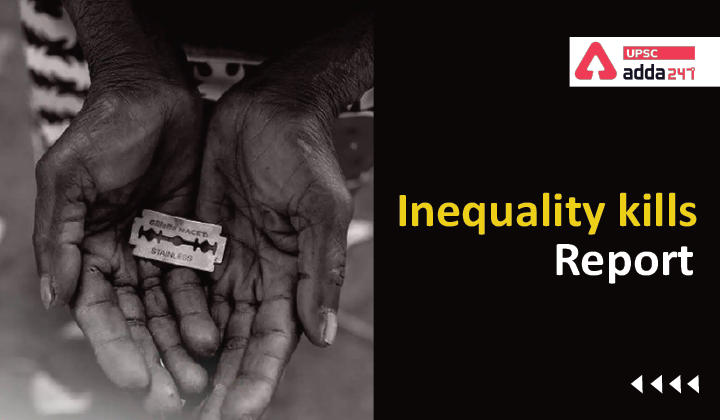Table of Contents
Inequality kills report: Relevance
- GS 2: Issues relating to development and management of Social Sector/Services relating to Health, Education, Human Resources.
Inequality kills report: Context
- Oxfam international has released a new report called ‘Inequality kills’ where it has stated that 160 million people were rendered poor during the pandemic, while the ten richest people doubled their assets since the start of the pandemic.
Inequality kills report: Key points
- The report identifies “vaccine apartheid” (unequal access to vaccines between countries) and the lack of universal vaccination programs as a cause of the emergence of multiple new strains of the coronavirus that has led to the continuation of the pandemic.
- Economic violence: Extreme inequality is a form of ‘economic violence’—where structural and systemic policy and political choices that are skewed in favor of the richest and most powerful people result in direct harm to the vast majority of ordinary people worldwide.
- Billionaire variant”: Billionaires’ collective wealth has increased by $5 trillion during the pandemic and this vertical aggregation of global wealth into the hands of a few is “profoundly dangerous for our world”.

Why the report says that inequality kills?
- The report identifies higher inequality with more crime and violence and less social trust.
- The brunt of inequality and the violence is borne by the vulnerable section of society like by women, Dalits in India, Black, Native American and Latinx persons in the United States and indigenous groups in many countries.
- Inequality induced climate crisis: Wealthiest 1% of humanity are responsible for twice as many emissions as the poorest 50%. Extreme neoliberal models of economic growth have led to a skewed system of carbon-intensive production, that favours richer countries while shifting the risk onto poorer countries.
Inequality Kills: India
- The report underlines that the pandemic has set gender parity back from 99 years to now 135 years.
- The stark wealth inequality in India is a result of an economic system rigged in favour of the super-rich over the poor and marginalised. For example, decreasing corporate taxes and increasing indirect taxes (through GST).
- Underfunding for public services: Sectors like health, education and social security schemes for workers are witnessing decrease in investment by the government.
- Privatisation is detrimental: The report further says that privatisation of basic services like health and education are detrimental to equality.
Inequality kills report: Recommendations
- Redistribute India’s wealth from the super-rich to generate resources for the majority: It is time for India to reintroduce a wealth tax (discontinued in 2016) to generate much-needed resources to fund the recovery from the pandemic.
- Generate revenue to invest in the education and health of future generations: A temporary ONE percent surcharge on the richest 10 percent population could help raise an additional INR 8.7 lakh crore, which could be utilised to increase the education and health budget.
- Enact and Enforce Statutory Social Security Provisions for Informal Sector Workers: While the government is recognising gig economy workers, it also needs to focus on laying the legal groundwork of basic social sector protections for 93 percent of India’s workforce.
- Change the rules and shift the power in the economy and society: It is time to reverse privatisation and commercialisation of public services, address jobless growth and bring back stronger social protection measures for India’s informal sector workers.
How wealth tax would impact the development schemes in India
- Four percent of wealth tax on the 98 billionaires can take care of Mid-Day- Meal programme of the country for 17 years or Samagra Sikshya Abhiyan for 6 years.
- One percent wealth tax on 98 richest billionaire families would finance Ayushman Bharat for more than seven years.
- One percent of wealth tax of the 98 billionaires in India can take care of the total expenditure for the school education and literacy.
- Four percent wealth tax on the 98 billionaires would be enough to fund the Mission POSHAN 2.0 (includes Anganwadi Services, POSHAN Abhiyan, Scheme for Adolescent Girls, and National Creche Scheme) for 10 years.
Also Read:




 TSPSC Group 1 Question Paper 2024, Downl...
TSPSC Group 1 Question Paper 2024, Downl...
 TSPSC Group 1 Answer key 2024 Out, Downl...
TSPSC Group 1 Answer key 2024 Out, Downl...
 UPSC Prelims 2024 Question Paper, Downlo...
UPSC Prelims 2024 Question Paper, Downlo...




